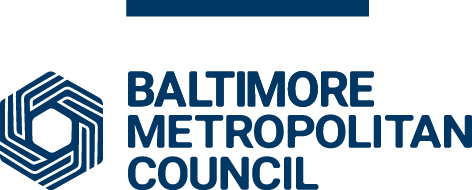
Maximize2045 will identify the region's transportation related goals and strategies and list the major projects the region expects to implement over the next 20-25 years.
This spring, the BRTB will release a draft Maximize2045, along with the 2020-2023 Transportation Improvement Program (TIP), for public review. We invite you to get involved in the process to update Maximize2045 by learning more about the steps and staying tuned for upcoming events and the public comment period.
GOALS
The first step in looking at the region’s transportation needs and challenges over the next 25 years is to develop an overarching set of guiding goals and strategies. The BRTB developed the following set of guiding principles for the projects and programs considered in Maximize2045:
- Improve System Safety – Make conditions safer for pedestrians, bicyclists, transit riders and operators, and motorists.
- Improve and Maintain the Existing Infrastructure – Improve the conditions of existing transportation facilities; systematically maintain and replace transportation assets as needed.
- Improve Accessibility – Help people of all ages and abilities to reach specific destinations.
- Conserve and Enhance the Environment – Pass on to future generations the healthiest natural and human environments possible.
- Improve System Security – Provide a secure traveling environment for everyone; improve the region’s ability to respond to natural and man-made disasters.
- Promote Prosperity and Economic Opportunity – Support the revitalization of communities, the development of activity centers, and the movement of goods and services.
- Foster Participation and Cooperation among All Stakeholders – Enable all interested and affected parties to participate and cooperate to find workable solutions.
- Promote Informed Decision Making – Ensure that adopted transportation policies and performance measures guide the regional decision making process.
:: View the detailed list of goals and strategies
FINANCIAL FORECAST
The projects to be included in Maximize2045 must take into account the level of financial resources that can reasonably be expected to be available through 2045.
The BRTB, in consultation with the Maryland Department of Transportation (MDOT), forecasts nearly $12.2 billion in federal, state, and private funds available for major capital projects between 2024 and 2045.
Of the $53 billion in total revenues, approximately $36.7 billion will go towards operations, and $16.3 billion will be set aside for system preservation.
As has been the trend for years, more and more funds are being designated for preservation and operations. As a result, the amount of money forecasted to be available for major capital projects has decreased in each of the past several long-range transportation plans. This makes for some tough choices as the BRTB considers the mix of projects to include in the draft plan.
WHAT'S NEXT?
The next steps of the process to develop Maximize2045 are:
- Project Evaluation – BRTB members have submitted a list of projects they’d like to have included in Maximize2045. BMC staff have evaluated the projects based on the scoring methodology adopted by the BRTB. Using the scoring result, the BRTB will select a list of projects that the region could implement over the next 20-25 years given the amount of money available.
- Draft Plan Released for Public Comments – A draft of the plan will be made public for a comment period during May and June 2019 and we’ll hold a public meeting in each jurisdiction in the Baltimore region.
- Respond to comments and vote on a final plan – The BRTB will then review and respond to public comments and vote on a final plan in July 2019.
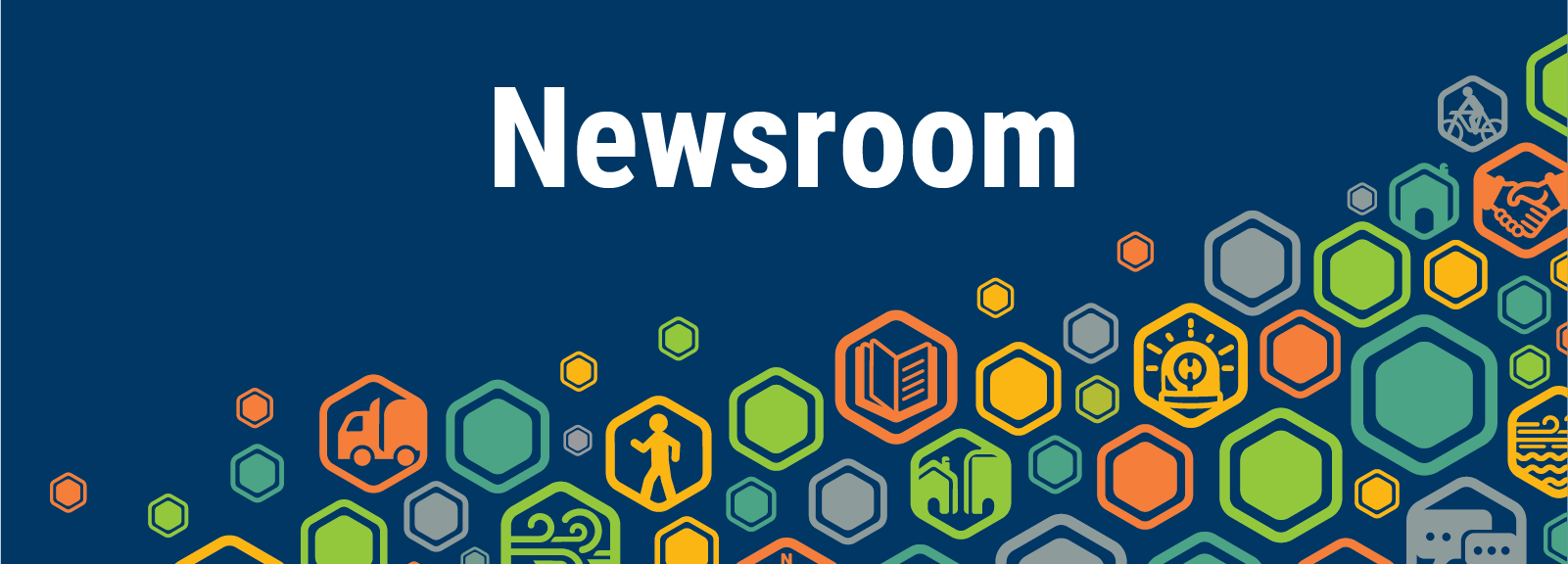
BALTIMORE, MD (January 26, 2018) – The Baltimore Metropolitan Council (BMC) hosted a meeting of its Board of Directors on Friday, January 26, 2018 at 8:30 a.m. at the House Office Build in Annapolis. The BMC Board of Directors unanimously approved Anne Arundel County Executive Steven Schuh as its chair and Baltimore Mayor Catherine Pugh as its vice-chair for calendar year 2018.
“Our residents' lives do not stop at our county or city lines. We must remember that we are all in this together, as our strengths - and weaknesses - can be felt across the region," Schuh said. "As the incoming chair of the BMC Board of Directors, I look forward to working with my elected and appointed colleagues from each of our member jurisdictions to enhance our region's quality of life and economic vitality."
Michael Kelly, BMC executive director, said that he looks forward to working closely with Schuh throughout the year.
“County Executive Schuh is a leader whose years of experience representing Anne Arundel County will be an invaluable resource to our organization,” Kelly said. "We look forward to working with him to advance the common priorities of the Baltimore region."
###
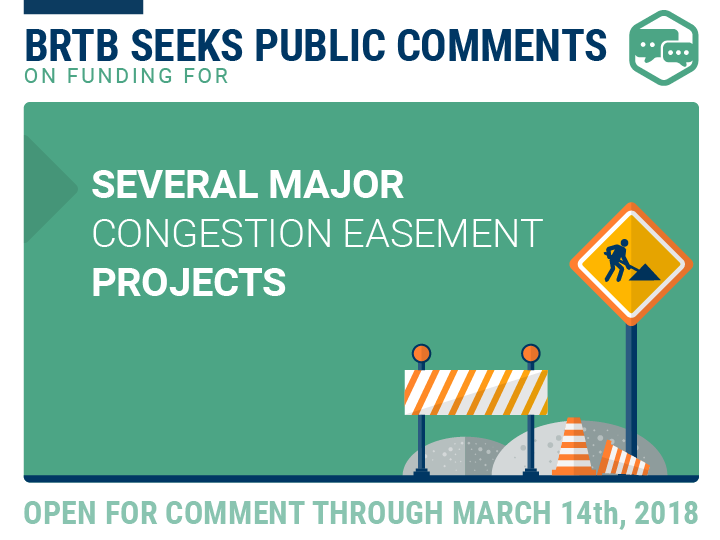
BALTIMORE, MD (February 12, 2018) – The Baltimore Regional Transportation Board (BRTB) welcomes comments through Wednesday, March 14, on new projects and funding updates to the 2018-2021 Transportation Improvement Program (TIP) and/or Maximize2040: A Performance-Based Transportation Plan for five Maryland State Highway Administration (SHA) projects and one Maryland Transportation Authority (MDTA) project.
The BRTB is scheduled to vote on the amendments on Tuesday, March 27, at 9 a.m. The BRTB also will host public meetings on Monday, February 26; Tuesday, February 27; and Monday, March 1.
About Maximize2040 and the TIP
Maximize2040 is this region’s $12.5 billion long-range transportation plan developed by the BRTB. Maximize2040 serves as the blueprint for fiscally constrained transportation planning in the Baltimore region from the year 2020 to 2040. The plan also establishes the region’s broad transportation goals and performance measures, which now serve as guiding principles as the region plans and carries out projects.
The 2018-2021 TIP is the list of regional transportation projects requesting federal funding in the near term. It includes more than $3 billion in proposed federal, state and local money for highway, transit, bicycle and pedestrian projects during the next four years. The funding goes towards maintaining, operating and expanding the transportation system. The TIP is fiscally constrained.
Updates occur in Maximize2040 and the 2018-2021 TIP because of changes to project scope and funding or changes to federal documentation policies. Public comment periods and meetings aim to keep communication open regarding these changes.
###
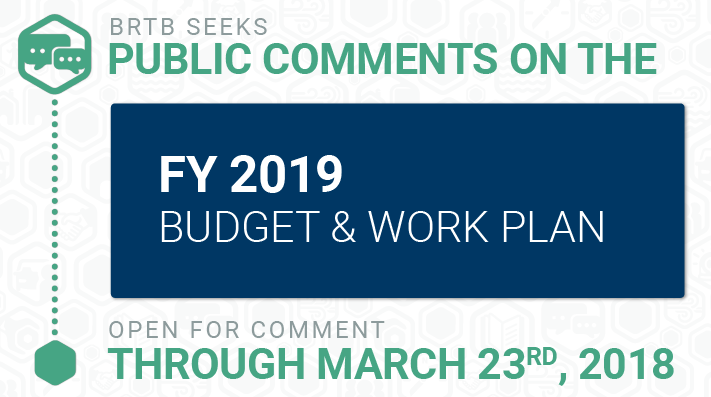
BALTIMORE, MD (February 21, 2018) – The Baltimore Regional Transportation Board (BRTB) seeks public comments on its proposed updated Budget & Work Program for Fiscal Year 2019 through Friday, March 23, 2018.
The BRTB is scheduled to vote on the proposed changes on Tuesday, April 24, 2018.
The BRTB’s Budget and Work Program is known as the Unified Planning Work Program (UPWP) for Transportation Planning. It details projects, studies and other activities to be completed by BRTB members and staff of the Baltimore Metropolitan Council (BMC).
The UPWP includes both local and region-wide activities. The BRTB develops this list of regional transportation planning activities every two fiscal years. This addendum updates the funding tables for FY 2019 and identifies several new tasks.
The updated UPWP includes a total budget for FY 2019 of $7,517,700 that is funded through new allocations of federal transportation funding and projected carryover from FY 2018 to support the additional tasks as outlined below. New local and regional projects include:
- Parole Town Center Transportation Master Plan – Anne Arundel County will conduct a comprehensive assessment of the existing and future mobility needs in the Town Center area.
- Columbia Gateway Transportation Improvement Implementation Strategy – Howard County will conduct a study for the Columbia Gateway, the 8 million squared-feet complex of commercial and industrial space. The complex is an important and critical driver of economic activity in Howard and Anne Arundel counties, as well as the region. It is starting to experience additional development pressure as restrictive covenants on properties expire.
- Kent Island Cox Creek Connector Study – Residents and visitors of Kent Island continue to experience increased traffic on the island, particularly during the summer months when beach-bound vehicles increase along the US 50/301 Bay Bridge Corridor. The majority of the congestion experienced on the island is attributed to increasing traffic volumes on the Bay Bridge, although Kent Island has experienced some growth caused by new residential areas, and retail and business-development. This project is to take the concepts from the Kent Island Transportation Plan and refine them into preferred alternatives and initial design.
The BRTB also proposes adding several new focus areas for BMC staff to pursue. They include:
- Assisting local jurisdictions in preparing project information for the Chapter 30 scoring and Priority Letter submittals;
- Studying and developing guidance on how to accommodate and utilize new or emerging transportation trends and technologies. Examples include: ride-hailing, shared-mobility, electric vehicles, connected and autonomous vehicles, or combination of them to support regional and local transportation, growth, and environmental goals;
- Performing forecasted population and employment scenario analysis. Current forecasts predict shifts in labor exchange between the Baltimore and Washington regions and greater reliance on labor force markets outside of the former. This analysis will explore how changing labor market locations impact planned transportation improvements and what shifts in the local labor market could take place.
B’More Involved
The public is invited to share their thoughts on these proposed regional transportation planning activities through Friday, March 23, 2018. Please send all comments in writing to:
Email: comments@baltometro.org
Twitter: @BaltoMetroCo or @BmoreInvolved, using #BRTBlistens
Mail: The Baltimore Regional Transportation Board
1500 Whetstone Way, Suite 300
Baltimore, MD 21230
Fax: 410-732-8248
Comments may also be shared during the Public Comment Opportunity at the BRTB meetings at 9 a.m. on Tuesday, March 27, 2018, or before the vote on Tuesday, April 24, 2018.
The BRTB is the federally recognized metropolitan planning organization for transportation in the region. BMC provides the BRTB with staff support.
The BRTB operates its programs and services without regard to race, color, or national origin in accordance with Title VI of the Civil Rights Act of 1964, and other applicable laws. Appropriate services can be provided to qualified individuals with disabilities or those in need of language assistance who submit a request at least seven days prior to a meeting. Call 410-732-0500.
###
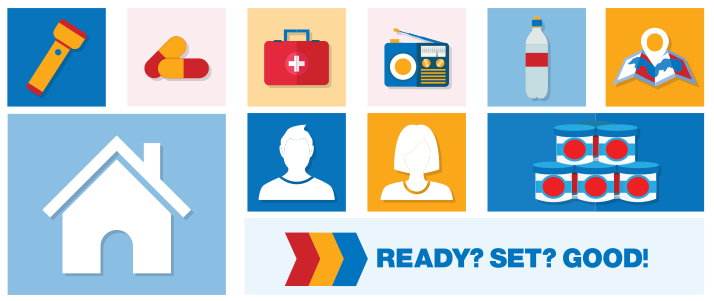
BALTIMORE, MD (April 5, 2018) – Extreme weather, power outages and other disasters happen every day around the world. Residents in the Baltimore region need to prepare at home before an emergency occurs.
“Ready? Set? Good!” is a call-to-action emergency preparedness campaign through the Baltimore Urban Area Security Initiative (UASI) that encourages people to, at minimum, put aside a portable, battery-powered radio, flashlight and one gallon of water per person, per day to help get them through those first critical hours when basic services are down. The campaign targets homeowners, heads of households, moms, dads, caregivers and families to prepare for an emergency before one happens.
The first 72 hours into an emergency are critical. It can take emergency personnel that long to restore basic services – electricity, heat, water, clearing of streets from snow and debris, etc. By preparing at home with a radio, flashlight and water, residents would:know what outside communication is available about the situation; navigate safely around the home; and stay hydrated.
“Ready? Set? Good!” also encourages residents to use a checklist to prepare other items – blankets, non-perishable foods, family plans, pet supplies, etc. Adults should keep a checklist in their wallets or purses as a reminder, and purchase items whenever they are at a store running other errands. For more information, including tips and a checklist of recommended items, visit www.readysetgood.org.
In addition, “Ready? Set? Good!” advertisements will appear on television, radio and digitally through Memorial Day weekend through partnerships with Entercom Communications and the Sinclair Broadcasting Group.
The “Ready? Set? Good!” emergency preparedness campaign is a regional effort funded by the Baltimore UASI, a preparedness grant from the federal government. UASI member jurisdictions include the City of Baltimore, the City of Annapolis, as well as Anne Arundel, Baltimore, Carroll, Harford and Howard counties. The committee also works closely with the Maryland Emergency Management Agency (MEMA).
###
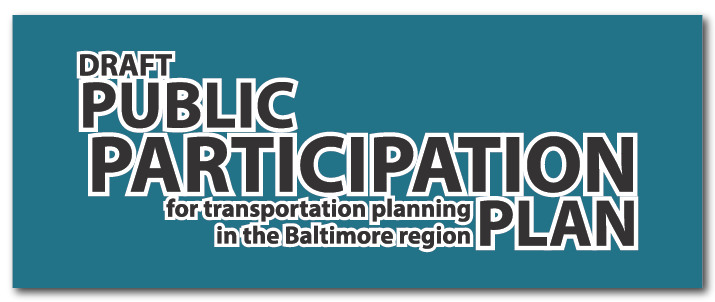
BALTIMORE, MD (April 10, 2018) – The Baltimore Regional Transportation Board (BRTB) will accept comments on a draft of the Public Participation Plan through Thursday, May 24.
View the BRTB's draft Public Participation Plan
The draft of the Public Participation Plan is scheduled for a vote before the BRTB on Tuesday, June 26.
The Public Participation Plan serves as a guide for residents in the Baltimore region to navigate the public process, while also outlining the policies and procedures to ensure that those coordinating the planning process engage the public. The mission of the Public Participation Plan is to provide an open process that offers reasonable access to information, timely public notice, full public access to key decisions, and support for early and continued involvement of stakeholders.
The BRTB’s Public Advisory Committee (PAC) helped to develop the draft through its Public Involvement subcommittee.
###

BALTIMORE, MD (May 10, 2018) – The Baltimore Metropolitan Council (BMC) staff grieves the sudden loss of Baltimore County Executive Kevin Kamenetz after hearing the news of his passing earlier this morning.
"We are deeply saddened by the sudden passing of County Executive Kevin Kamenetz, a member of the BMC Board of Directors," said Michael B. Kelly, executive director of the Baltimore Metropolitan Council. "County Executive Kamenetz chaired our board in 2015 and was a strong voice, advocate and leader for our region. Our most sincere condolences go out to his family and friends, as well as to our colleagues in Baltimore County Government."
###

BALTIMORE, MD (May 11, 2018) – The League of American Bicyclists recognized the Baltimore Metropolitan Council (BMC) with a Silver Bicycle Friendly Business (BFB) award, joining more than a thousand businesses across the U.S. that have received the award.
With the announcement of 114 new and renewing BFBs, BMC joins a cutting-edge group of 1,200 current Bicycle Friendly Businesses, made up of local businesses, government agencies, and Fortune 500 companies in all 50 states and Washington, D.C., that are transforming the American workplace.
“As we celebrate National Bike Month and the tenth year of the Bicycle Friendly Business program, the League of American Bicyclists is honored to recognize our latest new and renewing Bicycle Friendly Businesses. These companies and organizations are making their workplaces and their communities safer, happier, healthier, and more sustainable through bicycling,” said Amelia Neptune, director of the Bicycle Friendly America program. “We applaud these businesses, including the Baltimore Metropolitan Council, for leading the charge in creating a more bicycle-friendly America for everyone.”
BMC promotes cycling as a fun, healthy, inexpensive, and efficient alternative to Single Occupancy Vehicle commuting through its work as the coordinator of Bike to Work Day and an integral part of the Baltimore region's bicycle and pedestrian planning efforts. As a result, many of BMC's employees choose cycling as their mode of transportation to and from the organization's McHenry Row office. BMC encourages bicycling as an easy option for transportation and provides amenities to employees and guests, such as secure bike racks, a nearby Baltimore Bike Share docking station, and access to post-ride showering facilities.
"Commuting is a personal choice that we all must make, and BMC aims to provide facilities and amenities that open up its employees and guests to options that work with their lifestyles," said Michael B. Kelly, executive director of the Baltimore Metropolitan Council. "As a result, our employees are more in touch with the regional needs of commuters - whether they're traveling on two or more wheels."
Moving forward, BMC will have access to a variety of tools and technical assistance from the League to become even more bicycle-friendly. When our employees bike, great things happen: We help to decrease our region's carbon footprint, reduce health care costs, connect with the community, and promote a fun and healthy work culture.
To apply or learn more about the BFB program, visit the League online at www.bikeleague.org/business.
About the Bicycle Friendly America Program
To learn more about building a Bicycle Friendly America, including the Bicycle Friendly CommunitySM (BFCSM), Bicycle Friendly StateSM (BFSSM), Bicycle Friendly BusinessSM (BFBSM), and Bicycle Friendly UniversitySM (BFUSM) programs, visit www.bikeleague.org/BFA.
The League of American Bicyclists is leading the movement to create a Bicycle Friendly America for everyone. As leaders, our commitment is to listen and learn, define standards and share best practices to engage diverse communities and build a powerful, unified voice for change.
###

2018 Greater Baltimore State of the Region Report: Major changes during the past 20 years include growing diversity, educational attainment and an economy in transition.
BALTIMORE, MD (May 14, 2018) – A report being released today by the Greater Baltimore Committee and Baltimore Metropolitan Council, which looks at demographic and other changes that have occurred in the Baltimore region since 1998, finds that the region’s population has become more diversified, a higher percentage of residents hold college degrees, and the economy has transitioned from industrial manufacturing to one driven by technology, medicine, higher-education and service-based businesses.
These major shifts, which are still underway, bode well for the region’s future, the two organizations conclude in the Greater Baltimore State of the Region 2018 Report.
The report also compares the Baltimore Metropolitan Statistical Area (MSA) to 19 other peer metro regions, such as Atlanta, Dallas and Pittsburgh. The Baltimore MSA includes: Baltimore City, Baltimore County, Anne Arundel County, Carroll County, Howard County, Harford County and Queen Anne’s County.
Other findings in the report, to be released tonight at the Greater Baltimore Committee’s 63rd Annual Meeting and on the two organizations websites, point to several challenges that elected officials and the private sector should watch closely, including declining home ownership rates and increased commute times.
“On the whole, the report found that the Baltimore region has many positive trends that the private sector will be working to support and nurture to ensure the region retains a highly attractive business climate. The region’s strong shift to technology, medicine and the digital economy is particularly promising and shows the innovation and drive of our business community and major educational institutions,” said Donald Fry, President and CEO, of the Greater Baltimore Committee.
“Some findings in the report remind us that the GBC and private sector must continue to explore how we can continue to work with elected officials and others to ensure that the increased wealth and education that some segments of society have experienced helps lift those struggling with rising costs of living and the skill demands of the modern labor market.”
“On the one hand, the regions we analyze in this report are a benchmark for our own success. On the other, these regions represent our competition for attracting and retaining talented people and top employers. We must work cooperatively across sectors and political boundaries to advance our competitive position among our peers," said Mike Kelly, Executive Director, of the Baltimore Metropolitan Council.
"Over the last twenty years, the Baltimore region has seen notable increases in household income, cost of living, and population diversity. An important question for the next twenty years will be how rising incomes and costs impact our increasingly diverse community. There is a lot of progress to be proud of in this report and our hope is that through cooperation and thoughtful investment in places and people we will see continued improvement in the years to come.”
The report considers a variety of indicators in seven key measures to gauge the strengths and weaknesses of the Baltimore region and 19 peer regions. They are: Demographics; Economy; Business; Employment; Education & Workforce; Transportation; and Quality of Life.
Some of the key changes that occurred in the region include:
The Baltimore’s population diversified much faster than its peers. The region’s Hispanic population grew by 125 percent, while the Black or African American population grew by 130 percent. In fact, Baltimore led its peers in Hispanic population growth and saw the fourth highest percentage gain in the Black or African American population since 1998.
The region saw significant improvement in educational attainment. More than 37 percent of the region’s population 25 and older had a college education in 2017, up from 25 percent in 1998. The gains pushed the Baltimore region to No. 7 among the peer group, up from No. 13 in 1998 for the percentage of the population with college degrees. Also among adults 25 and older, more than 26 percent of the population’s highest level of education was a high school diploma in 2017, up from 18 percent in 1998. That improvement moved the Baltimore MSA to the No. 8 position, up from No. 10, among its peer group for high school education.
Business ownership also improved in the 20-year period. The percentage of women-owned firms rose to more than 21 percent, up from 16 percent, while the percentage of Hispanic-owned firms rose to more than 2 percent, up from just more than 1 percent. The percentage of Black-owned businesses rose to more than 5 percent, up from more than 3 percent in 1998.
Per capita personal income and median household income surged between 1998 and 2017 in the Baltimore region. In fact, the region had the second highest growth rate among its peers for per capita personal income, which increased 52 percent to $38,406, up from $25,347. The region experienced the third highest growth rate in median household income, which doubled to $76,788 from $38,361.
The home ownership rate in the region fell to just more than 65 percent, from almost 72 percent in 1998. That pushed Baltimore to No. 8 among the peer metro regions for home ownership, down from the No. 5 spot in 1998.
Average travel time to work increased by five minutes, from 26 minutes in 1998 to 31 minutes in 2017, making average commutes in the Baltimore region the 4th longest among its peers. Ridership on heavy and light rail in the region also declined to 19.8 million from 24.6 million. That pushed Baltimore to No. 10 among its peers for rail ridership, down from the No. 6 spot in 1998.
As Fry and Kelly note in their forward in the report, the State of the Region data and findings will “inform decision makers of strengths that can be leveraged to ensure an attractive business climate and economic vitality, as well as weaknesses that need to be addressed to ensure the region doesn’t falter and become inconsequential compared to its peers.”
The GBC and BMC plan to use the State of the Region Report to develop policy recommendations, competitiveness strategies and programs that promote workforce skills, diversity in leadership and inclusiveness in the economy.
The 2018 State of the Region Report marks the seventh time the GBC has collaborated to publish such a study. The first report was published in 1998 by the GBC and the Greater Baltimore Alliance. Through the years, subsequent reports have been published by the GBC, BMC and the Economic Alliance of Greater Baltimore. The two most recent updates released in 2007 and 2011 were joint efforts of the GBC and BMC.
Note to journalists: Digital files of the infographics and the Top 5 and Bottom 5 charts in the State of the Region Report are available for publication by contacting the media relations contacts listed on this release. Any art supplied MUST carry the source credit line: Courtesy of the Greater Baltimore Committee and Baltimore Metropolitan Council.
ABOUT THE GREATER BALTIMORE COMMITTEE
The Greater Baltimore Committee (GBC) is a regional organization of business and civic leaders that includes businesses, nonprofit organizations and educational and civic institutions. It is the leading voice for the private sector in the Baltimore region on issues relating to economic growth, job creation, workforce development, transportation, the business climate and quality of life. The GBC’s membership is comprised of over 500 member organizations, including large, mid-size and small companies, nonprofits, education and foundations in the Greater Baltimore region.
ABOUT THE BALTIMORE METROPOLITAN COUNCIL
The Baltimore Metropolitan Council (BMC) works collaboratively with the chief elected officials in the region to create initiatives to improve the quality of life and economic vitality. BMC, as the Baltimore region’s council of governments, hosts the Baltimore Regional Transportation Board (BRTB), the federal metropolitan planning organization (MPO), and supports local government by coordinating efforts in a range of policy areas including emergency preparedness, housing, cooperative purchasing, environmental planning and workforce development. BMC’s Board of Directors includes the executives of Anne Arundel, Baltimore, Harford and Howard counties, the mayor of the City of Baltimore, a member of the Carroll County and Queen Anne’s County boards of commissioners, a member of the Maryland State Senate, a member of the Maryland House of Delegates, and a gubernatorial appointee from the private sector.
###

BALTIMORE, MD (May 16, 2018) – Bike To Work Day in the Baltimore region is postponed until Friday, June 1, because of forecasted severe weather on Friday, May 18. The spirit of Bike to Work Day is to promote bicycling as a safe and healthy commuting option. While many cyclists regularly commute in an array of weather, the threat of flooding and lightning storms, present very real concerns for participants' safety from the Bike to Work Day committee and local public safety agencies.
More than 1,500 cyclists have registered to meet up at 48 pit stop locations around the Baltimore region for the 21st annual Bike to Work Day. Registration will remain open until Wednesday, May 30. Those who registered for May 18 pit stops do not need to re-register.
Bike to Work Day events throughout the region will feature group convoy rides, bicycle tune-ups, riding challenges, free food and drinks, free custom 2018 T-shirts, and other prizes - including two bikes, courtesy of two of our sponsors, Joe’s Bike Shop and Race Pace Bicycles. Cyclists must register for a pit stop to be eligible for the T-shirt or enter into the raffle for two Trek FX 2 bicycles.
Bike to Work Day is a national campaign that celebrates bicycling as a healthy commuting option, while promoting public awareness of its safety and environmental factors. Bike to Work Day helps raise awareness of the rules of the road for drivers, pedestrians and cyclists, and highlights the need to improve bicycle facilities to improve safety. Many of the Bike to Work Day partners are an integral part of the year-round transportation planning process across the region to improve the roads for everyone.
###
